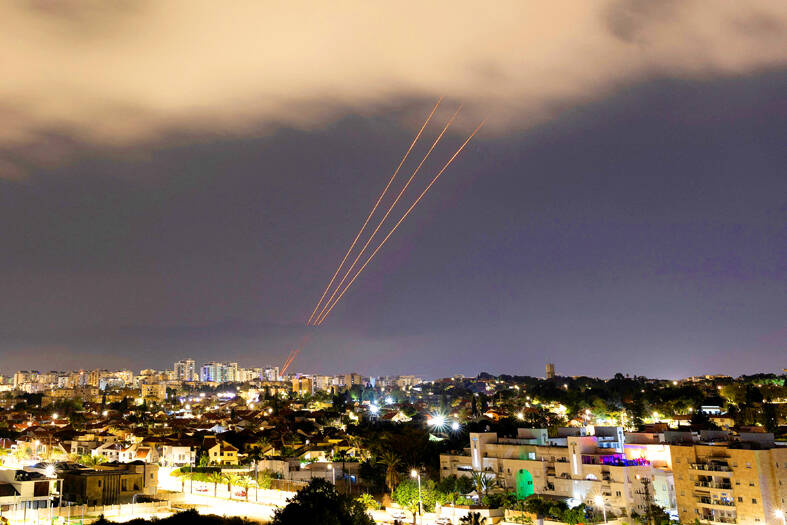Iran yesterday warned Israel and the US of a “much larger response” if there is any retaliation for its mass drone and missile attack on Israeli territory overnight, as Israel said “the campaign is not over yet.”
The threat of open warfare erupting between the arch Middle East foes and dragging in the US has put the region on edge as Washington said the US did not seek conflict with Iran but would not hesitate to protect its forces and Israel.
Iran launched the attack over a suspected Israeli strike on its consulate in Syria on April 1 that killed top Revolutionary Guards commanders and followed months of clashes between Israel and Iran’s regional allies, triggered by the war in Gaza.

Photo: Reuters
However, the attack from hundreds of missiles and drones, mostly launched from inside Iran, caused only modest damage in Israel as most were shot down with the help of Jordan, the UK and the US.
An air force base in southern Israel was hit, but continued to operate as normal and a seven-year-old child was seriously hurt by shrapnel. There were no other reports of serious damage.
Iranian Minister of Foreign Affairs Amir Abdollahian said Tehran had informed the US that its attack on Israel would be “limited” and for self-defense.
“We intercepted, we repelled, together we shall win,” Israeli Prime Minister Benjamin Netanyahu said on social media ahead of a planned 3:30pm meeting of the war cabinet to discuss a response to the attack.
Israeli Minister of Defence Yoav Gallant said despite thwarting the attack, the military campaign was not over and “we must be prepared for every scenario.”
Israel’s Channel 12 TV cited an unnamed Israeli official overnight as saying there would be a “significant response” to the attack.
Global powers Russia, China and France, as well as Arab states Egypt, Qatar and the United Arab Emirates urged restraint.
Iranian Armed Forces General Staff Chief Major General Mohammad Bagheri said that “our response will be much larger than tonight’s military action if Israel retaliates against Iran” and told Washington its bases could also be attacked if it helped Israel retaliate.
US President Joe Biden has pledged “ironclad” support for Israel against Iran, but did not announce any military response on Saturday night, saying instead he would coordinate a diplomatic response with other Western leaders.
However, the US House of Representatives would make a change in its schedule to consider legislation that supports Israel and holds Iran accountable, House Majority Leader Steve Scalise said in a statement on Saturday.
“The House of Representatives stands strongly with Israel, and there must be consequences for this unprovoked attack,” he said in a statement.
More details would follow, he said.
Scalise’s office did not immediately respond to an inquiry seeking clarification of what legislation would be considered.
It was unclear whether he was referring to a stand-alone bill to aid Israel, or the US$95 billion supplemental spending bill that includes US$14 billion for Israel, in addition to US$60 billion for Ukraine, support for Taiwan and billions of dollars in humanitarian assistance.

Taiwan yesterday denied Chinese allegations that its military was behind a cyberattack on a technology company in Guangzhou, after city authorities issued warrants for 20 suspects. The Guangzhou Municipal Public Security Bureau earlier yesterday issued warrants for 20 people it identified as members of the Information, Communications and Electronic Force Command (ICEFCOM). The bureau alleged they were behind a May 20 cyberattack targeting the backend system of a self-service facility at the company. “ICEFCOM, under Taiwan’s ruling Democratic Progressive Party, directed the illegal attack,” the warrant says. The bureau placed a bounty of 10,000 yuan (US$1,392) on each of the 20 people named in

The High Court yesterday found a New Taipei City woman guilty of charges related to helping Beijing secure surrender agreements from military service members. Lee Huei-hsin (李慧馨) was sentenced to six years and eight months in prison for breaching the National Security Act (國家安全法), making illegal compacts with government employees and bribery, the court said. The verdict is final. Lee, the manager of a temple in the city’s Lujhou District (蘆洲), was accused of arranging for eight service members to make surrender pledges to the Chinese People’s Liberation Army in exchange for money, the court said. The pledges, which required them to provide identification

Nine retired generals from Taiwan, Japan and the US have been invited to participate in a tabletop exercise hosted by the Taipei School of Economics and Political Science Foundation tomorrow and Wednesday that simulates a potential Chinese invasion of Taiwan in 2030, the foundation said yesterday. The five retired Taiwanese generals would include retired admiral Lee Hsi-min (李喜明), joined by retired US Navy admiral Michael Mullen and former chief of staff of the Japan Self-Defense Forces general Shigeru Iwasaki, it said. The simulation aims to offer strategic insights into regional security and peace in the Taiwan Strait, it added. Foundation chair Huang Huang-hsiung

’DISTORTION’: Beijing’s assertion that the US agreed with its position on Taiwan is a recurring tactic it uses to falsely reinforce its sovereignty claims, MOFA said The Ministry of Foreign Affairs (MOFA) yesterday said Chinese state media deliberately distorted Taiwan’s sovereign status, following reports that US President Donald Trump agreed to uphold the “one China” policy in a phone call with Chinese President Xi Jinping (習近平). During the more than one-hour-long call, Xi urged Trump to retreat from trade measures that roiled the global economy and cautioned him against threatening steps on Taiwan, a Chinese government summary of the call said. China’s official Xinhua news agency quoted Xi as saying that the US should handle the Taiwan issue cautiously and avoid the two countries being drawn into dangerous